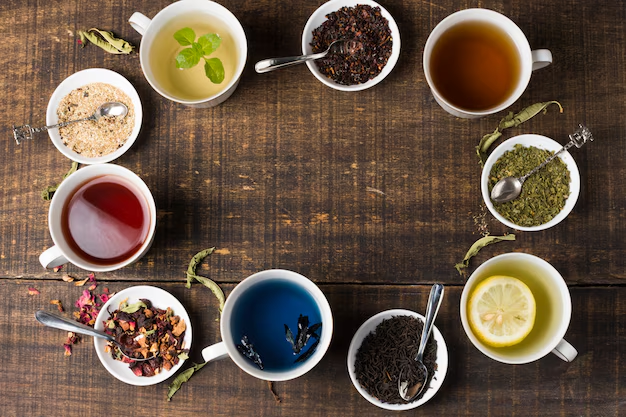Tea is one of the world’s most popular beverages, but is tea good for your heart? This question has intrigued researchers for decades. Various types of tea, including green, black, herbal, and decaffeinated, are celebrated for their potential heart health benefits.
Packed with antioxidants and other beneficial compounds, tea may support cardiovascular health by improving cholesterol levels, reducing blood pressure, and enhancing blood vessel function. Let’s dive deeper into how different types of tea contribute to heart health.
Is Tea Good for Your Heart?
Tea contains powerful compounds like flavonoids and antioxidants, which are known to promote cardiovascular health. These compounds reduce oxidative stress, a major contributor to heart disease.
Regular tea consumption has been linked to lower levels of LDL (bad cholesterol) and improved HDL (good cholesterol), which are critical for a healthy heart.
How does Tea Boost Heart Health?
- Antioxidants: Compounds such as catechins in green tea fight free radicals, protecting the heart from damage.
- Flavonoids: Found in many teas, flavonoids help reduce inflammation and improve blood vessel elasticity.
- Cholesterol Management: Several studies suggest that tea can help lower LDL cholesterol, reducing the risk of plaque buildup in arteries.
Types of Tea and Heart Health
Different teas offer unique benefits. Green tea is renowned for lowering cholesterol and blood pressure. Black tea is known for its positive effects on blood vessel health. Herbal teas, such as hibiscus, have additional heart-friendly properties. Each variety of tea prevents cardiovascular diseases, making it an easy and enjoyable way to improve cardiovascular health.
Breakdown by Tea Type
Let’’s discuss the impact of different types of tea on heart health.

Green Tea
It is perhaps the most studied when it comes to heart health. Its high content of catechins, a type of antioxidant, is key to its benefits.
- Lowers Cholesterol: Green tea reduces LDL cholesterol levels while improving HDL cholesterol.
- Improves Blood Flow: Catechins enhance the flexibility of blood vessels, which can lower blood pressure.
- Reduces Inflammation: Chronic inflammation is linked to heart disease, and green tea helps combat this effectively.
Drinking 2–3 cups of green tea daily can be a simple step toward better heart health.
Black Tea
Black tea is rich in flavonoids, which have been shown to support heart function.
- Improves Blood Vessel Health: Black tea helps relax blood vessels, improving blood circulation.
- Reduces Heart Risks: Regular consumption can reduce the risk of heart attacks and strokes.
- Low-Cost and Versatile: Black tea is widely available and can be consumed plain or with milk.
For optimal benefits, limit added sugar or sweeteners when enjoying black tea
Decaffeinated Green Tea
For those sensitive to caffeine, decaffeinated green tea is an excellent choice.
- Maintains Benefits Without Caffeine: It still contains antioxidants like catechins, though in slightly reduced amounts.
- Suitable for All Ages: It’s perfect for people avoiding caffeine due to heart conditions or personal preferences.
- Promotes Relaxation: Without caffeine, it can be consumed at night for relaxation while still benefiting the heart.
Herbal Teas
Herbal teas are diverse and offer unique heart-health benefits.
- Hibiscus Tea: Known for lowering blood pressure, it’s a favorite for those managing hypertension.
- Peppermint Tea: Offers mild relaxation effects and supports healthy digestion, which indirectly benefits heart health.
- Chamomile Tea: Helps reduce stress and promotes better sleep, both crucial for heart health.
- Dandelion Tea: Acts as a natural diuretic, helping to reduce water retention and lower blood pressure.
- Ginger Tea: Contains anti-inflammatory properties that support overall cardiovascular health.
Including a variety of herbal teas in your diet can provide a range of heart-friendly compounds.
To Read: Is Ginger Good for Acid Reflux?
Mint Tea
Mint tea, often considered a digestive aid, also benefits the heart.
- Boosts Circulation: Peppermint contains menthol, which improves blood flow.
- Relieves Stress: Stress management is crucial for heart health, and mint tea provides a calming effect.
- Anti-Inflammatory: It helps reduce inflammation, which can damage blood vessels over time.
A refreshing cup of mint tea after meals can aid digestion and heart function simultaneously.
Milk Tea
Adding milk to tea is common in many cultures, but does it impact tea’s heart benefits?
- Flavonoid Absorption: Studies suggest that milk may slightly reduce the absorption of flavonoids, but the overall benefits remain significant.
- Calcium Boost: Milk adds calcium, which supports healthy blood pressure levels.
- Balanced Choice: Opt for low-fat or plant-based milk alternatives to avoid added saturated fats.
While milk tea may not provide the same level of antioxidants as plain tea, it can still be part of a heart-healthy lifestyle when consumed in moderation.
Other Considerations
There are some other considerations that every person should keep in mind before taking tea.
Tea vs. Coffee for Heart Health

Coffee and tea both offer cardiovascular benefits but in different ways. Tea, particularly green and herbal varieties, is packed with antioxidants that reduce inflammation and improve blood pressure. Coffee contains chlorogenic acids, which can support heart health by improving cholesterol metabolism.
Key Comparisons:
- Caffeine Levels: Coffee typically has more caffeine, which may not be ideal for people with heart conditions.
- Antioxidant Content: Tea generally has a wider variety of heart-healthy antioxidants.
- Heart Rate Impact: Coffee may temporarily raise heart rate, while tea is milder on the system.
If your priority is heart health, tea is often the gentler and more beneficial option.
To Read: Is Coffee Good for Liver Health? A Comprehensive Guide
Best Tea for Heart Health
If you’re looking for the top teas for cardiovascular wellness, here are the winners:
- Green Tea: Best for reducing cholesterol and improving blood flow.
- Hibiscus Tea: Effective in managing high blood pressure.
- Black Tea: Great for improving artery function.
- Peppermint Tea: Ideal for relaxation and circulation.
Choosing the right tea depends on your specific health goals and preferences.
Can Tea Clean Arteries and Reduce Plaque?
Tea can’t directly “clean” arteries, but its compounds play a supportive role. Flavonoids in green and black tea reduce oxidative stress, which prevents plaque buildup in arteries. Regular tea consumption has been linked to improved arterial flexibility, which may reduce blockages over time.
- Plaque Reduction: The antioxidants in tea slow the oxidation of LDL cholesterol, a key factor in plaque formation.
- Blood Vessel Health: Tea improves the health of endothelial cells lining blood vessels, ensuring better blood flow.
While tea isn’t a magic cure, it can significantly contribute to healthier arteries as part of a balanced diet.
Who Should Not Drink Tea?
While tea is generally safe, certain individuals should exercise caution.
- Caffeine Sensitivity: People who are sensitive to caffeine may experience jitters or heart palpitations from caffeinated teas.
- Iron Deficiency: Tea contains tannins, which can interfere with iron absorption. Avoid drinking tea with meals if you’re anemic.
- Pregnant Women: Excessive caffeine intake may not be safe during pregnancy. Herbal teas should also be consumed cautiously.
- Allergies: Some herbal teas may cause allergic reactions in sensitive individuals.
Can Tea Raise Blood Pressure or Cholesterol?
Tea’s impact on blood pressure and cholesterol is generally positive, but there are nuances to consider:
- Blood Pressure: Excessive consumption of caffeinated tea may temporarily raise blood pressure in sensitive individuals. Herbal teas like hibiscus, however, are known to lower blood pressure.
- Cholesterol: Tea primarily reduces LDL cholesterol, but sugar or high-fat milk additions can counteract these benefits.
Moderation is key to maximizing the health benefits of tea while avoiding potential risks.
FAQs
- Is ginger tea good for heart palpitations?
Ginger tea may help ease heart palpitations by calming the nervous system and improving blood flow. However, consult a doctor if palpitations persist, as underlying conditions might require specific treatment.
- Is green tea good for heart palpitations?
Green tea contains antioxidants that support heart health but also caffeine, which may trigger palpitations in sensitive individuals. Decaffeinated green tea is a safer alternative for those with irregular heartbeats.
- Does tea raise cholesterol?
Most teas, particularly green and black, help lower cholesterol. However, sugary or creamy tea variants might contribute to higher cholesterol levels. Opt for unsweetened, antioxidant-rich teas for heart health benefits.
Conclusion
Tea is a heart-healthy beverage that offers a wide range of benefits. From green tea’s cholesterol-lowering effects to herbal teas’ blood pressure management, there’s a tea for everyone. Antioxidants, flavonoids, and other beneficial compounds in tea work together to reduce cardiovascular risks, improve artery health, and support overall wellness.
Remember, moderation is essential. Too much of a good thing can lead to adverse effects. It’s also wise to consult a healthcare provider if you have specific health concerns or conditions that may interact with tea.
Enjoying a daily cup of tea isn’t just a delightful ritual—it’s a step toward better heart health.


